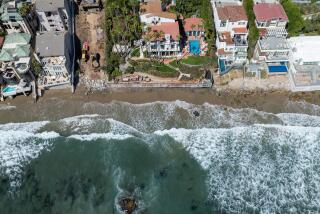In Summer, Trouble Comes in Cans, Bottles
With the busy summer season fast approaching, police who patrol Orange County’s beach cities are once again gearing up to face their biggest and oldest adversary: alcohol.
While skinheads, street gangs and Fourth of July rioters have garnered headlines, police officers report that alcohol intoxication is actually the common denominator in a wide array of crimes, ranging from bar fights and reckless driving to domestic violence and vandalism.
“Drinking has always been a characteristic of the beach. People come down here to have fun and forget about their problems,” said Laguna Beach Police Chief Neil J. Purcell Jr., who estimates that 50% of the arrests his department makes are alcohol-related.
“Drinking alters their personalities,” he added. “It doesn’t take much to set them off.”
The link between beach crime and intoxication is underscored in a new report by the Newport Beach Police Department, which found that more than 40% of all arrests made in the city last year involved drinking. About 60% of the alcohol-related arrests, the study found, took place along one commercial district of bars, restaurants and liquor stores on the Balboa Peninsula.
*
Alarmed at how the incidents are dominating police resources, cities are increasingly using their zoning and planning powers in an effort to control the situation.
Officials now conduct extensive background checks on businesses applying for alcohol licenses and in some cases have adopted ordinances prohibiting the sale of beer, wine and liquor within several hundred yards of the beach.
Laguna Beach recently took the symbolic step of refusing to host volleyball and surfing tournaments sponsored by liquor companies.
Some merchants are wary of the aggressive approach, which they fear will drive customers away if taken too far.
“We want to be good neighbors,” said Stan Anderson, owner of Coach’s Sports Grill and president of the Seal Beach Business Assn. “But we don’t want to lose business.”
City officials agree that they must balance the needs of commerce and law enforcement. But they insist that cities can no longer afford to dismiss drunkenness as just another element of beach culture.
“It eats up a lot resources,” said Sgt. John Desmond of the Newport Beach Police Department. “It ties up officers who could be doing something else.”
Alcohol intoxication is a problem that plagues police throughout the county.
But drinking seems to hold a unique place along the coast, especially during the summer when millions of beach-goers flock to the area.
“There’s a good-time atmosphere here that makes drinking very acceptable,” said Kari Walker, an office supply manager who has lived in downtown Huntington Beach for 12 years. “People come down here . . . and do things I don’t think [they would] do at home.”
Walker and her neighbors have endured years of disturbances on July 4 caused by partyers who roam the streets setting bonfires, exploding fireworks, throwing debris at police and vandalizing property. Police make dozens of arrests each year, many for public intoxication.
Alcohol is banned on beaches and piers, but beach-goers can easily break the rules by pouring beer into soda cans or drinking it out of plastic water bottles and paper cups. Some officers have even seen people bury six-packs of beer deep into the sand and sip it from long straws that rise to the surface.
Police admit they don’t have the resources to catch all violators, but they are employing some new tactics aimed at better monitoring and regulating the sale of alcohol.
*
Laguna Beach, for example, has required some sidewalk cafes that serve alcohol to post hostesses in the outdoor seating areas and dispense beer and wine in glasses instead of in portable plastic cups.
The city also prohibits new businesses located within 200 yards of its Main Beach from selling booze. As a result, the mini-mart of a new gas station off Coast Highway will not stock beer or wine.
Up the coast, Seal Beach has also taken a tough stance, due in large part to the tireless activism of residents who live around Main Street.
But the city’s actions--such as limiting the hours that some restaurants can serve alcohol--have raised concerns from Main Street merchants.
“If you have to close up early on a nice summer night even if you have a full house, that’s going to hurt,” Anderson said. “I think we need a certain amount of leeway.”
Restaurants traditionally have a low survival rate, merchants said, and the odds are even lower if an establishment is prevented from selling alcohol.
“How can you be an Italian restaurant and serve spaghetti but not red wine?” said John Baker, a Seal Beach liquor store owner.
Baker and Anderson said they understand the residents’ desire to keep their neighborhood quiet but fear that draconian regulations could drive customers away from Seal Beach to more bubbling districts like Belmont Shore in Long Beach.
“We are competing for dollars with other cities on the coast,” Anderson said. “We need a level playing field.”
(BEGIN TEXT OF INFOBOX / INFOGRAPHIC)
Busting Drunks
More than 40% of arrests made in Newport Beach last year were in some way linked to alchol. Six in 10 of these alchohol- related arrests took place near the bars, restaurants and beach shops on Balboa Peninsula.
*
Alcohol- related arrests:1,552
Total arrests: 3,717
*
How alcohol arrests break down:
Bar fights, etc.: 252
Public drunkenness: 839
Drunk driving: 41
Source: Newport Beach Police Department
More to Read
Sign up for Essential California
The most important California stories and recommendations in your inbox every morning.
You may occasionally receive promotional content from the Los Angeles Times.











